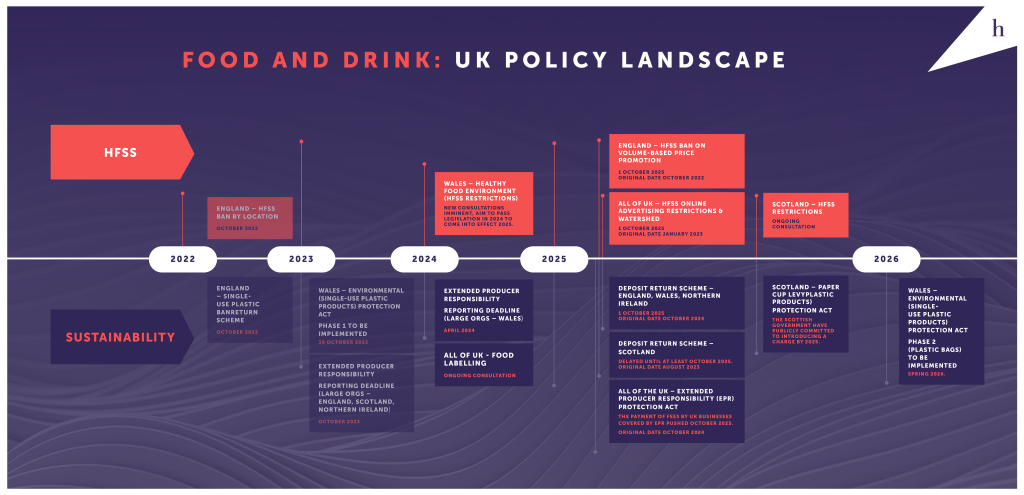Given the amount of substantial regulatory changes facing the food and drink sector, this new Government will be having to make decisions on complex areas of policy very early in their first term.
With so many delays in recent years – from HFSS price promotion and advertising restrictions through to EPR fees and DRS schemes – 2025 is set to be a huge year of change for food and drink businesses. The remainder of this year is therefore going to be vitally important, both to influence policymakers to ensure smooth implementation and to prepare internally for compliance.

Labour’s Priorities
With vote-winning policies being the main focus, and without access to civil service support, the bandwidth that can be afforded to complex policy issues like extended producer responsibility is limited. The sector, therefore, shouldn’t be expecting significant interventions this side of the election or detailed manifesto commitments.
That being said, the various Shadow Ministerial teams are giving thought to ‘day one’ issues – and issues like this will be being raised in their access talks with civil servants as health and the environment are core to Labour’s missions underpinning its future approach to governing. This presents an opportunity for businesses in the sector to begin pointing shadow teams to the kind of issues they need to be considering and what they need to be raising with civil servants, so that they are best equipped to make the necessary decisions – informed by industry expertise.
HFSS
Health policies have mostly been focused on the NHS in recent years given the pressures from the pandemic, increases in waiting times, and salience with the public. However, preventative health measures are increasingly beginning to be debated amongst policymakers, particularly around regulating foods that are high in Fat, Salt and Sugar (HFSS).
Measures to tackle obesity, particularly in children, as well as reducing consumption of sugar and ultra-processed foods (UPFs), have been mentioned in some form by both the Conservatives and Labour in recent months. Added scrutiny is also being placed on these policies from the new House of Lords Food, Diet and Obesity Committee, as well as the influential Times Health Commission.
As things stand, the current government remains ideologically disinclined to go further with regulation and, in any event, has limited time to do so. However, both Shadow Health Secretary Wes Streeting and Labour Leader Sir Keir Starmer’s recent comments reflect a change of approach. Labour have already proposed to press ahead with the ban on HFSS adverts at 9pm and the control sales of vapes. An incoming Labour Government may feel compelled to act on these issues and make good on their promises relatively early.
Despite this emphasis, Labour will want to avoid alienating industry early on, so therefore would be open to working with the industry on ideas and solutions to improve health. Early measures would likely be ones with wide agreement amongst industry and with limited direct public impact, so not measures such as the expansion of the sugar tax.
The Labour Party is also keen to regulate but not just for the sake of regulation. Our intel suggests they want to support consumers to make better choices for their personal health rather than dictate vast changes. Moreover, they want to incentivise the food and drink industry to help consumers make these better choices with the aim of reducing the incidences of chronic disease and preventable conditions. Businesses should therefore be expecting renewed focus on labelling and guidance.
Sustainability
In terms of the circular economy and sustainability more generally, a core industry focus is on the continually delayed deposit return scheme (DRS). Globally, the UK is already lagging behind in this respect, with Ireland launching their Re-Turn scheme earlier this year and, with expected announcements like the promised Interoperability Statement now delayed, there is limited prospect of the current government making significant further progress this side of an election.
Much will therefore be left for Labour to pick up. Like HFSS policies, Labour say they are not eager to regulate if unnecessary – though how this holds up in government remains to be seen. Given DRS is such a controversial policy in the UK with all four nations having a slightly different preferred approach, Labour will likely want to take time to learn from lessons in Ireland and the failed attempt in Scotland, as they ponder their decisions in advance of the potentially taking power.
On a host of other sustainability issues, Labour’s naturally more interventionist mindset is likely to see requirements on businesses increase over time. Businesses who want to influence that process will need to be engaging positively with the party in developing those requirements, offering the environmental solutions Labour will be looking for rather than relying on objections to business burdens to block or delay them.
What will this mean for businesses?
A new government will have only a few months to make a series of go or no-go decisions and, if it wants to avoid further delays, will have to swiftly work to press ahead with regulations and guidance. For some policies, like DRS, it’s already too late to meet the current October 2025 timeline, meaning government will have to completely re-assess progress and adopt a more realistic timeframe going forward. Businesses need certainty to adequately plan and prepare, something which the party is mindful of, having put on record its commitment to delivering “a clear and consistent policy framework that businesses can trust and prosper within.”
The expertise and knowledge only industry can bring will be essential for this process. So far, the complex practicalities of implementation have too often been overlooked in government. It will only be through close engagement with policymakers in the Department for Environment, Food and Rural Affairs; the Department for Health and Social Care; Number 10; and the devolved administrations that businesses will be able to ensure that any new government adopts a different approach.
Hanover has vast experience and expertise in helping businesses engage on these issues, as well as a dedicated general election planning team which is informed by an experienced group of influential Labour advisers. Should you wish to hear more about how Hanover can support your business, please get in touch at nwyatt@hanovercomms.com.



